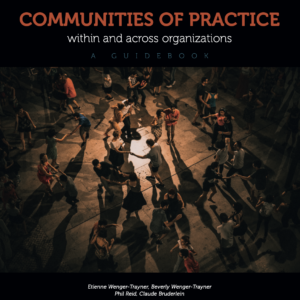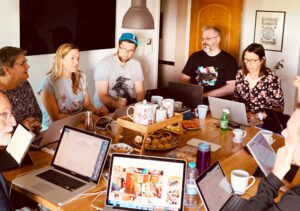NOTICE: There is an updated version of all these FAQs on our new website:
How do communities of practice use wikis?
Wikis, such as MediaWiki used by Wikipedia and Wikispaces which is popular for Educators, are used by communities of practice to create and publish collective, co-authored documents, including web pages. They also use wikis as interactive workspaces for conducting projects or for creating a shared memory of events. The use of wikis range from mere accumulations of resources to full co-authoring of text.-
- Accumulation. For communities, the easiest way to use a wiki is as a repository to which everyone can contribute in order to accumulate text, images, and other resources–for instance bibliographies, lists of pointers of interest, descriptions of tools, etc. In such cases, the advantage of wikis is that it is potentially very easy for members to add to the repository at any time. In practice it requires a certain discipline to remember to enter resources on the wiki and to tag or link to it so that it can be easily found by other members.
- Co-authoring. Wikis also afford the ability to edit the same text collectively, so that over time, a jointly edited wiki can come to represent the mind of the community. Examples include wiki documents that represent the community’s knowledge (documentation of a practice, key principles, lessons learned from projects) or wiki documents that define the community itself (community agreements, evolving learning agenda, public statements or descriptions). In practice, this tight co-authoring of a communal text is more difficult than accumulation because it requires enough trust that people can start editing each other’s writing with confidence they are not overstepping their bounds. It often requires coordination and conventions for negotiating edits.
- Shared memory. A wiki is sometimes used to co-create a shared memory of an event or a series of events. Members share notes, photographs, resources and other artifacts from a meeting or a workshop. They may even use the wiki as a working space during the meeting. This shared memory – of content and processes – can then serve both the people who attended the meeting and those who did not. Newcomers at future meetings can use this shared memory to get a sense of what happens at meetings, who attended, and what has been produced.
<< What use are media-sharing sites? How do communities use blogs? >>
For more information, click here:
For a more precise definition, see our theory page on communities of practice:
For a bit more info, see our general (but brief) introduction to communities of practice and their use in various contexts:
For practical advice on cultivating communities of practice, see our new guidebook:
For workshops on cultivating communities of practice:



Pingback: Are the new “web 2.0″ technologies relevant? | Wenger-Trayner